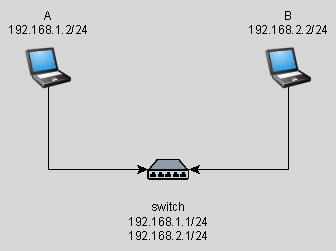What you're looking for is VLANs
Mikrotik
A community-contributed sublemmy for all things Mikrotik. General ISP and network discussion also permitted. Please ensure if you're asking a question you have checked the Wiki First: https://help.mikrotik.com
Mikrotik Rules: Don't post content that is incorrect or potentially harmful to a router/network.
This in itself is not a bannable offence but answers that are verifiably incorrect or will cause issues for other users will be edited or removed.
Examples: Factual errors - "EOIP is always unsecure" Configuration problems - Config that would disable all physical interfaces on a router Trolling - "Downgrade it to 5.26"
Isn't it simpler to have two bridges with their own subnet and some firewall rules to prevent interaction between the two?
That’s essentially what VLANs are.
Mikrotiks normally have hardware acceleration for VLANs and switching for only 1 bridge. Beyond that, traffic has to go through the CPU.
Multiple bridges were one of the old ways, before hardware offloading.
The way to do it is to have 1 bridge, register the vlans on the bridge, tag/untag all the bridge ports as appropriate, set PVIDs as appropriate. Add 2 VLAN interfaces (this gives the CPU access to the VLAN), add static IPs to the vlan interfaces, set up DHCP appropriately.
Always worth taking a backup of the config, then enable hardware offloading last. If you end up locking yourself out, reset and reload the config, figure out what you did wrong.
Enable safe mode too? If there’s a problem while in safe mode just power cycle the router and the last good config before safe mode enables should come back up.
I’d still do a backup in addition to play it safe though.
VLANs do this but on the same device.
Depends on what hardware you have I guess.
Actual bridges aren't really a thing these days, but unmanaged switches are still common, which are essentially just switches with all ports configured in the same VLAN that you can't change.
Whether you use dedicated physical devices or virtual LANs (VLANs) for the access ports where you connect you client devices, you'd likely still end up using different VLANs in whatever router or firewall you put inbetween those.
Yes, you can technically configure multiple subnets on the layer 2 broadcast domain, but that would be less secure and more prone to problems.
Thank you very much to all of you for your input !
I see port in few of your feedback.
I was not clear enough, let me rephrase:
is it possible to give a subnet to a node, not based on the port of the switch/router but based on the node ?
meaning that the switch/router need to recognize the node ( MAC or login? ) and then will give him access to A or B
Thanks.
Are you dead set on ROS 6.4? ROS7 has significant improvements
